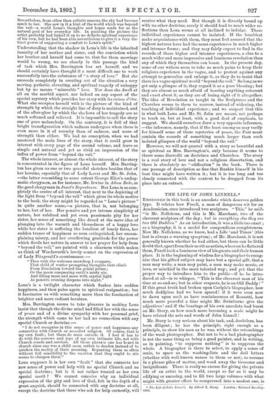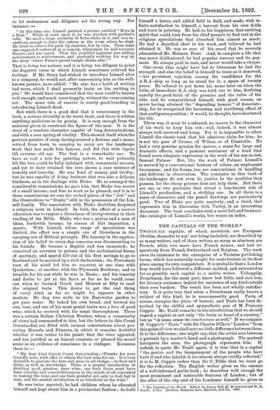THE LIFE OF JOHN LINNELL.* EMBEDDED in this book is
an anecdote which deserves golden type. It relates how Fuseli, a man of dangerous wit for an Academician, once introduced two sculptors. "This," he said "is Mr. Nollekens, and this is Mr. Marchant, two of the cleverest sculptors of the day ; but in everything else they are two Old Daddies." As an introduction, it was a little too exact ; as a biography, it is a model for compendious completeness. Now Mr. Nollekens, as we know, had a Life 'and Times' (this last is always a warning symptom) ; of Mr. Marchant, it is not generally known whether he had either, but there can be little doubt that, apart from their merit as artists, whereon he flattered them, Fuseli took a luminous view of his guests and their human place. It is the beginning of wisdom for a biographer to recog- nise that his gifted subject may have but a special gift, that a man may write, a man may paint, a man may make music, or laws, or mischief in the most talented way ; and yet that the proper way to introduce him to the public—if he be intro- duced at all—is to whisper, "This is the cleverest man of his time at so-and-so ; but in other respects, he is an Old Daddy ! " If this great truth had broken upon Carlyle's biographer, how much daddyism had we been spared! if it were even now to dawn upon such as have reminiscences of Rossetti, how much more peaceful a time might Mr. Swinburne give the adjectives ! and if the bearings of his own anecdote had burst on Mr. Story, on how much more becoming a scale might he have related the acts and words of John Linnell !
Mr. Story is very serious about his task, and, doubtless, has been diligent ; he has the principle, right enough as a principle, to show his man as he was, without the retouchings of the weak photographer. But not to be a bad photographer is not the same thing as being a good painter, and in writing, as in painting, "to suppress nothing" is to suppress the whole. A biographer is there to select, to apply a sense of scale, to spare us the washing-lists and the dull letters (whether with well-known names to them or not), to resume in a phrase piles of matter, and weed away the tiresome and insignificant. There is really no excuse for giving the private life of an artist to the world, except so far as it may be edifying or amusing, and to fill two large volumes with what might with greater effect be compressed into a modest one, is
• The Life of John Linneit. By Alfred T. Story. London : Richard Bobtley. 1E92.
to let seriousness and diligence act the wrong way. For instance :—
" At thia time also Linnell painted a picture entitled "Boys in a Boat." While at work upon it, he was stricken with painter's colic. He used a large quantity of flake-white in it, and was in- cautious enough to have the canvas in the room where he slept. He tried to relieve his pain by exercise, but in vain. Then some one suggested castor-oil as a remedy, whereupon he had recourse Thereto, and was cured. Thus the youthful aspirant was adding achievement to achievement, and gradually working his way up the steep where Fame's proud temple shines afar.' "
That is being too serious, and it is being too diligent to print the doggerel verse in which Linnell sometimes relieved his feelings. If Mr. Story had wished to introduce Linnell alive to a company, he would not, after announcing him as the well- known painter, have added : "He also has a habit of writing bad verse, which I shall presently insist on his reciting to you." He would have considered that the man could he known well enough, and much more happily, without the verse coming out. The same rule of reserve is surely good-breeding in introducing Linnell dead.
But while there is a good deal that is unnecessary in the book, a serious triviality is its worst fault, and there is seldom anything malicious in its gossip, It is easy enough from the material given to construct the figure of the man. It is the -story of a resolute character capable of long determinations, and with a rare spring of vitality. This showed itself when the portrait-painter of sixty, having secured a fortune and a name, retired from town to country to carry out the landscape work that has made him famous, and did this with vigour till extreme old age. The feat is a remarkable one. To have so real a love for painting nature, to wait patiently till the love could be fully indulged with commercial success, -and yet to have retained the love, shows a rare mixture of honesty and tenacity. He was fond of money, and thrifty; but be was capable of doing business that was also a delicate kindness, as in his dealings with Blake. He so arranged the considerable commissions he gave him, that Blake was secure of a small income, and free to work as he pleased, and it is to those commissions we owe the etched plates of the " Job " and the illustrations to " Dante " still in the possession of the Lin- etell family. The association with Blake doubtless deepened a religious bent in Linnell. In both, the effect of a narrow education was to impose a literalness of interpretation in their 'reading of the Bible. Blake, who was a genius and a man of ideas, forthwith became, by reason of this imposition, a mystic. With Linnell, whose range of speculation was limited, the effect was a simple one of literalness in the carrying out of Biblical precepts. His honesty in the applica- tion of his belief to every-day concerns was disconcerting to his friends. He became a Baptist and was immersed ; he conceived an aversion to priests and the ecclesiastical forms of marriage, and spared £50 out of his first savings to go to 'Scotland and be married by a civil declaration ; the Protestant turn of his mind led him to coquette at one time with Quakerism ; at another, with the Plymouth Brethren ; and to tremble for his son while he was in Rome ; and his tenacity and desire to get at the facts as far as he could, came -out when he learned Greek and Hebrew at fifty to read the original texts. This desire to get the real thing -of every kind, as far as might be, appears in other matters. He dug two wells in his Bayswater garden to get pure water. He baked his own bread, and brewed his own beer, and one of his most genial traits was a love of good wine, which he secured with his usual thoroughness. There was a certain Italian Christian Brother, whom a community of views had commended to him, but the letters to this Count Gnicciardini are filled with earnest exhortations about pro- curing Marsala and Priorala, in which it remains doubtful whether it was rather to his palate that the wine appealed, and was justified as an honest creature, or pleased his moral -sense as an evidence of conscience in a vintager. Keenness there is :—
" My dear kind friend, Count Guicciardini,—Thanks for your friendly note, with offer to obtain the best wine for me. It is very desirable to procure the true and pure in all things,—in food and -drink, as well as knowledge. There is a mental satisfaction in drinking good, genuine, pure wine ; one feels there must have been veracity and conscientiousness in the minds of all concerned in making the wine, and one feels grateful not only to God, but to man, and the mental satisfaction is as beneficial as the wine."
He was twice married ; he had children whom he educated thimself and kept about him in a patriarchal fashion ; he built himself a house, and added field to field, and made, with in- finite satisfaction to himself, a harvest from his own fields and trees in painting. He had, to his happiness, that untiring spirit that could turn from his chief pursuit to find rest in the religions speculations that absorbed him almost as much. He had a dignified ideal in his work, and believed he had attained it. He was so sure of his creed that he severely admonished Mr. Holman Hunt. And, to complete a life that was never disillusioned, he had popular success and its pay- ment. He always paid in cash, and never would take a cheque.
One event that might have led to bitterness he had the strength and also the belief in himself to treat as it deserved, —his persistent rejection among the candidates for the A.R.A.-ship so long as he stood for it, a space of twenty years. He refused to put down his name later on when the bribe of immediate R.A.-ship was held out to him, doubting equally the good faith of the promise and the value of the title, and he congratulated himself, with good reason, on never having attained the "degrading honour" of Associate- ship, for he recognised the harassing and sterilising effect of that ambiguous position ; it would, bethought, have shortened his life.
There was, it must be confessed, no reason in the character of his work to keep him out ; and, indeed, it was almost always well received and hung. For it is impossible to allow Linnell the classic rank that his admirers claim for him ; he is not the peer of Crome, of Wilson, or of Constable. He had a very genuine passion for nature, a senselor large and dramatic effects, and a pastoral sentiment of a kind that found more adequate expression in the work of his son-in-law, Samuel Palmer. But, like the work of Palmer, Linnell's is marred by a conventional hotness of colour, an unpleasant brownness ; and his forms, too, are conventional in handling and deficient in observation. The examples in this book of his landscapes do not even do justice to the qualities they possess, for the cheap process does not help them. But there are one or two portraits that reveal a less-known side of Linnell's production, and a striking one. In all there is a sense of character, and the pencil drawings are particularly good. Two of Blake are quite masterly, and a third, that represents him in discussion with Varley, is an interesting document. The book concludes with a most full and business- like catalogue of Linnell's works, but wants an index.



































 Previous page
Previous page